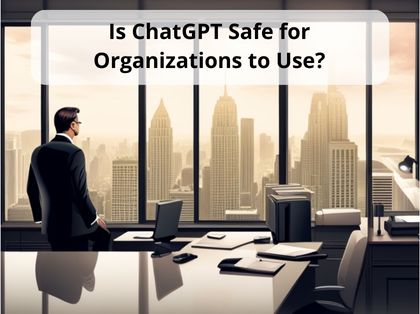
Unless you’ve blocked ChatGPT at your organization, there’s a good chance some of your employees are using it today — possibly right this moment. But is leveraging ChatGPT or similar AI-powered chatbots safe for your organization? And what are the implications for security, privacy and liability?
I consulted several experts on this topic, including those from various parts of the global cybersecurity firm I work for — BlackBerry — to uncover the things every organization should discuss when it comes to using ChatGPT or similar tools.
ChatGPT is the fastest-growing digital platform in history, amassing more than 100 million users in its first two months of availability. For comparison’s sake, consider Facebook: at the end of its first year, it had slightly more than one million users.
ChatGPT is the first widely accessible "natural language processing" chatbot driven by artificial intelligence. It can interact in human-like conversations and generate content such as emails, books, song lyrics, and application code.
As with all new technologies, generative AI models like ChatGPT can be a source of both benefits and risks. After researching industry best practices, some organizations are deciding that — at least for now — the risks outweigh the benefits. As a result, they may choose to declare the use of ChatGPT unauthorized, and block access to it from company networks until appropriate support and direction can be established.
ChatGPT and Business Risk: What to Consider
Although it's still too early to know all of the potential trade-offs associated with this AI tool, here are some risks from using ChatGPT — and an increasing number of similar tools — that every organization should consider.
Data leakage and security considerations of AI Chatbots
If sensitive third-party or internal company information is entered into ChatGPT, that information will become part of the chatbot's data model, and can be shared with others who ask relevant questions, resulting in data leakage. Any unauthorized disclosure of confidential information into ChatGPT (or any online source) may violate an organization’s security policies.
Legal considerations of AI Chatbots
If ChatGPT security is compromised, content (ChatGPT input/output) that an organization may have been contractually or legally required to protect may be leaked and attributable to the organization — which could impact the company's reputation. ChatGPT is a third-party system that absorbs information into its data. Even if AI bot security isn't compromised, sharing any confidential customer or partner information may violate your agreements with customers and partners, since you are often contractually or legally required to protect this information.
There are also complications when it comes to who owns the code that ChatGPT generates. Terms of service indicate that ChatGPT output is the property of the person or service that provided the input. Complications arise when that output includes legally protected data that was gathered from the input of other sources.
There are also copyright concerns if ChatGPT is used to generate written material inspired by copyrighted property, including licensed open-source materials. For example, if ChatGPT is trained on open-source libraries and “replays” that code when answering a question, and a developer then puts that code into products a company ships, it could place the company in violation of “unfriendly” OSS (Open Source Software) licenses.
And here’s an important note: Terms of service indicate that ChatGPT cannot be used in the development of any other AI. The use of ChatGPT in this way could jeopardize future AI development, if your company is in that space.
ChatGPT currently warns users about providing or inputting sensitive or personal information, such as names or email addresses. However, it's unclear how the creators of this tool comply with international privacy laws, or whether appropriate controls are in place to protect personal data and respect individuals’ rights to their data.
Your organization will have to evaluate for itself whether ChatGPT — and the many AI tools that will follow — is safe to utilize.
Embracing leading-edge technologies can certainly enable business, but new platforms should always be evaluated for potential cybersecurity, legal and privacy risk. I hope the points I shared in this article will spark conversations at your organization, so you can evaluate the best ways to proceed.
